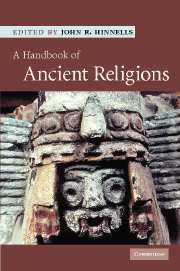Book contents
- Frontmatter
- Contents
- List of illustrations
- List of maps
- List of tables
- List of contributors
- Introduction
- 1 Palaeolithic art and religion
- 2 Ancient Egypt
- 3 Religion in ancient Ugarit
- 4 Mesopotamia
- 5 Ancient Israel to the fall of the Second Temple
- 6 Greek religion
- 7 Religions in the Roman Empire
- 8 Ancient Europe
- 9 The Indus Civilization
- 10 The religion of ancient China
- 11 Aztec and Inca civilizations
- Index
- References
6 - Greek religion
- Frontmatter
- Contents
- List of illustrations
- List of maps
- List of tables
- List of contributors
- Introduction
- 1 Palaeolithic art and religion
- 2 Ancient Egypt
- 3 Religion in ancient Ugarit
- 4 Mesopotamia
- 5 Ancient Israel to the fall of the Second Temple
- 6 Greek religion
- 7 Religions in the Roman Empire
- 8 Ancient Europe
- 9 The Indus Civilization
- 10 The religion of ancient China
- 11 Aztec and Inca civilizations
- Index
- References
Summary
An introduction to recent scholarship on Greek religion
Greek religion is not a subject that the Greeks themselves would have recognized. Religion was not an abstract category, and the language had no generic term to identify it. Action was more important than ideas. Ritual acts accompanied almost every human activity, but piety could be measured only by being visibly displayed action. Men and women performed rituals to demonstrate expectation of divine response, but people did not have to enter a sanctuary or visit a temple to recognize the power of the gods. Because attention to the divine was a constant concern, and because ritual was almost always a social event, evidence can be found in any ancient source. Information is embedded in the works of ancient poets, philosophers, dramatists and orators, as well as in the works of artists and the architectural remains, inscriptions and the debris of daily life turned up by the archaeologist's spade. We often find important information where we least expect it.
The scholarship on Greek religion has always concentrated on basic questions, such as the problem of origins, the nature of divinity, the relation between myth and ritual, and the connections between Greek ideology and other belief systems of contemporary Near Eastern cultures. In the eighteenth century scholars tried to make Greek religion look like Christianity; in the nineteenth close attention was paid to literary sources that identified the Greek belief system as unique; by the early twentieth century the invention of ethnographical research had convinced some classical scholars that Greek religion was a fascinating collection of ‘primitive’ responses to a confusing and unstable environment.
- Type
- Chapter
- Information
- A Handbook of Ancient Religions , pp. 266 - 317Publisher: Cambridge University PressPrint publication year: 2007



